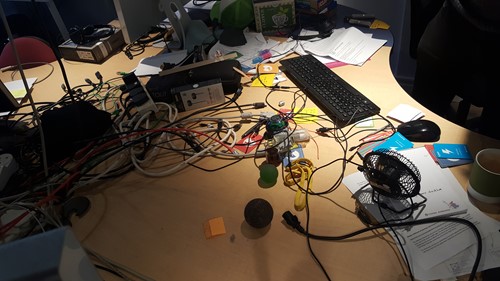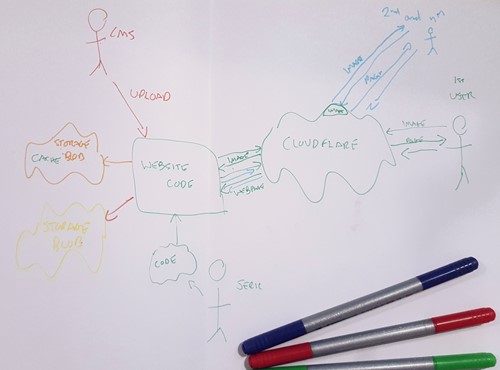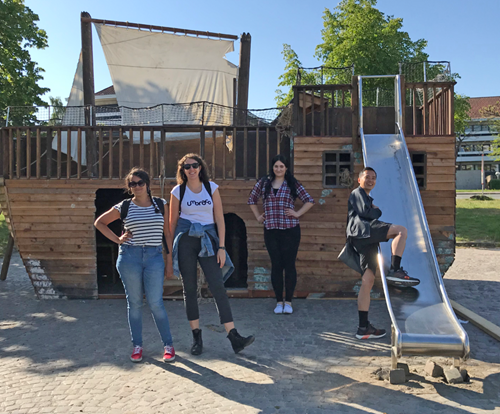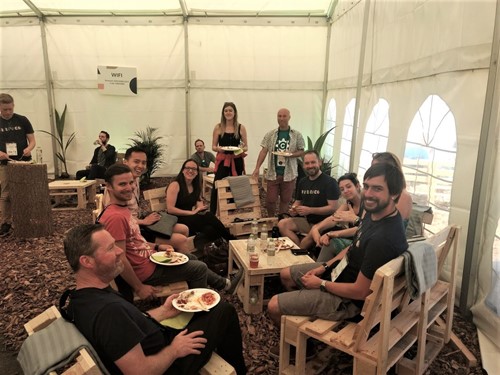Zero to Tech
Heads Up!
This article is several years old now, and much has happened since then, so please keep that in mind while reading it.
Like most of us who graduated in those lofty-sounding but unspecific disciplines, like Literary Theory or European Art History, I’m used to being asked, sometimes quite obnoxiously, what exactly the point of my degree is. It’s true that arts degrees don’t often have the same immediate, apparent real-world applicability that Business Management might. And yes, it’s true that in a rapidly-evolving technological world, being Very Good At Shakespeare probably doesn’t reap many financial advantages. Thanks for the insight, Jeremy.*
As one of these creative types, over the years, you learn to make the best of what is popularly known as your "transferable skills". In many instances throughout my employment career I’ve been called on to make use of the kind of organisational acumen that once enabled me to reverse-chronologically file three years’ worth of illegibly-photocopied notes from literary anthologies so dense they could conceivably be classified as furniture. Being able to shape the chaos handed to you is a hard-earned skill, and a very useful one if you end up in busy, messy, or fast-paced work environments.

Entering the Tech World
I started working at Crumpled Dog just under three years ago. Prior to that I had been working another job nearby, unofficially in charge of the company website, because apparently being the youngest employee in the business was enough to qualify me for the task, despite my only previous experience of working with websites being the HTML tags that I'd learnt to type out on my MySpace profile back in 2006 to make the text go different colours. Crumpled Dog was hired to maintain the company’s site, and through my contact with them I ended up being asked to interview for a digital project assistant position that had opened at Crumpled the following year. With no tech experience on my CV, it really was those transferable skills (and a scintillating personality, obviously) that made me a viable candidate for the job.
Being thrust into a tech environment was a case of going from zero to sixty in an incredibly short space of time. Working at Crumpled Dog was the first new job I’d taken on that actually required specialised knowledge – and specialised knowledge that would need to be practically applied, by me, on major projects. It was a big leap into the unknown, and required a very rapid learning curve.
It’s easy to get frustrated at a non-tech person’s lack of understanding sometimes. We’ve all probably had that experience of trying to gently coax a parent or grandparent through the use of some new-fangled web-based technology, and grimacing patiently as we watch them select the entirely wrong part of the menu even though we clearly said to click on the home icon – no, not that one – the home icon – the HOME ICON, granddad!
Coming into this job, I had some concern that the developers on my team wouldn’t have the time to sit down and go through the ABCs of Umbraco with me, and would become frustrated if they had to. Fortunately, I was around some very kind and patient people who were generous with their time and explanations. Even now, I'm sometimes presented with a colour-coded picture diagram to illustrate complicated concepts, which is both a useful learning tool, and often a work of art in its own right…

For people trying to get into a new line of work like this, the patience of colleagues is invaluable. It can be off-putting in a new job role, when you’re already having to navigate the established social dynamics of the team you’ve been dropped into, to be made to feel ignorant or incompetent too. Having people willing to help you through that learning period means being able to get better at what you do more quickly, and when everyone feels able to do their job competently, you get better results. The breaking down of divisions that can occur along job-lines by encouraging the sharing of different points of view fosters better cohesion amongst the team, and allowing a collaboration of different perspectives has demonstrable advantages.
Advantages of a Non-Tech Perspective
As a team trying to deliver the best product for a client, you can occasionally come up against requests that are not feasible, or that the experience and knowledge of the developers contradicts. It’s easy to forget how obvious something isn’t to someone on the outside, when your inside knowledge of how something works is so thorough. For someone who’s very tech-lite, it’s easier for me to assume the client’s position, to consider their point of view. The advantage is that the developers on the team don’t have to find tactical ways of explaining roadblocks to me, so we can bash out the potential kinks in a project ahead of time quickly and efficiently, unhindered by "the best way to phrase it", and then come to the client with a fully considered proposal.
There are also always different potential angles to come at a problem. We all know the expression of not being able to see the wood for the trees – an alternative perspective from someone who’s standing back, taking a broader overview can be useful, and a non-tech insight on a problem can reveal things that a technical view might have obscured. Project managers, content editors and site users all have a different perspective that can highlight a totally different usability issue that may not have been considered by the other, and we should treat these views as worthwhile. That said – and, please, indulge my extended tree metaphor – there’s no use shouting opinions from inside a shuttered woodcutter’s hut that’s in the village outside this forest. You can only really provide a useful point of view if you’ve ventured into the woods to begin with. And this is why helping to engage non-tech people with the tech side of website development is so important.

How to Continue to Support Engagement for All
The Umbraco community is fantastic, there’s no disputing it. Although the people – both tech and non-tech – who use the CMS engage with the community aspect at varying levels, the most positive take-away I’ve found from being around this community, is that it is always open, whether you choose to engage or not. Although I kept rather to the sidelines during my first Codegarden experience in 2017, by the time the second one came along I was ready to take part, and found myself being greeted with friendly, open arms at every turn.
There are, of course, aspects to this engagement that are, by definition, inaccessible to non-technical Umbracians. Attending meet-ups and talks, and going to UKFest or Codegarden is great for connecting socially with other people, and helps you keep your finger on the pulse of what’s happening, but it's safe to say there’s absolutely nothing for someone like me in a two hour-long presentation about Unit Testing.
This year’s Codegarden saw a good variety of non-tech, or tech-lite talks (how to improve back-office user experience, for example) which balanced necessary technical information with an accessible, applicable use for this information. I’d love to see more of this – a widening of scope when it comes to presentations and a sharing of information in a way designed to increase inclusion. Thinking about how to encourage project managers and content editors, whose experience of using Umbraco is different, not lesser, to come along to Umbraco events would enable more people to increase their knowledge and make useful contributions, and help to foster the sense that what we do belongs to everyone.

Obviously, we can’t all do the same job and be at each other’s level all the time – I’m not aiming to be able to write a line of code any time soon, and I wouldn’t ask the lead developer on one of our projects to discuss costs and scheduling with a client. There’s a lot to be said for being brilliant as a specialist in your own field, but I think there’s room for a synergy of talents and an improved knowledge and competency across the board, for all.
When we increase the accessibility and applicability of the information we share, we enable participation from a greater number, and more diverse range, of people. To me, that democratic attitude to participation is a key tenet of what makes the Umbraco community great – open source, in every sense of the word – and something we should continue to encourage wherever we can.
* In case this meme didn't make it internationally, I'd like to clarify that Jeremy is not a real person I have beef with.